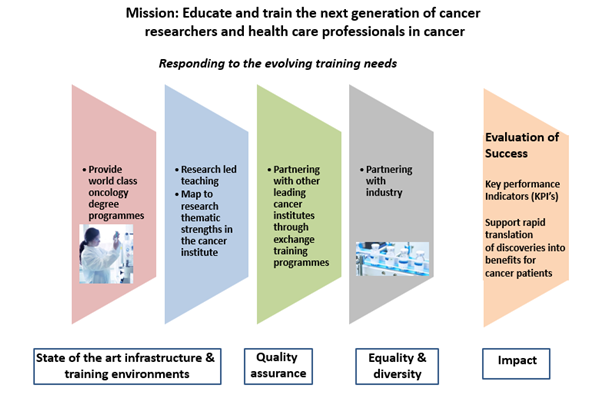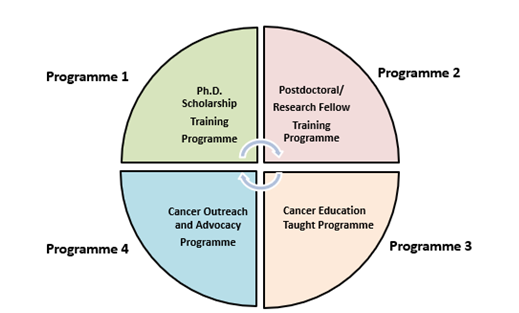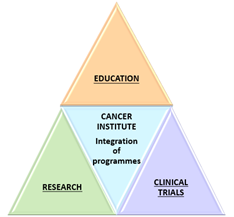Education at Trinity St. James’s Cancer Institute
Education Lead: Professor Jacintha O’Sullivan Prof. in Translational Oncology
Executive Summary:
Education mission: Everyone involved in cancer care within the Trinity St. James’s Cancer Institute will have access to world-class cancer training, education and oncology information. We will educate and train the next generation of cancer researchers, clinicians, and health care professionals through flexible designed cancer education programmes. We have four structured programmes addressing the education needs along the career development pathway of our trainees. Our education strategy is mapped to our thematic research strengths. Engaging with other Cancer Institutes globally through education mobility programmes is key, in addition to partnering with industry and charities. Under education, we also embrace working closely with schools, patients, the public and with cancer charities, ultimately positioning the Trinity St. James’s Cancer Institute as a hub for cancer education.

Within the Trinity St. James’s Cancer Institute Cancer Education Pillar, there are 4 programmes as illustrated below. An education advisory board has been established and will work closely with the Cancer Institute Executive Committee to develop and execute these programmes.

PROGRAMME 1: Ph.D. Scholarship Training Programme
What changes will this make to our current Ph.D. training schemes in cancer education?
- New Cancer Ph.D. training will be developed and structured
a) Supervision structure will be different: Scientific and Clinical PI supervision
b) Carry our research rotations (currently not in the system)
c) Cross discipline designed projects for maximum impact
d) Tailor the education modules to complement translational Ph.D. project of trainees
e) International mobility training element incorporated (increase global connections for TCD e.g., with other Cancer Institutes)
f) PPI engagement
g) Links with Industry
h) Links with the Clinical Trial Network in the Cancer Institute
i) Significant increase in scholarly activity: publications, citations, international presentations, research impact
j) Structure competitive for ITN Marie Curie Ph.D. training network and Collaborative Doctoral Awards
PROGRAMME 2: Postdoctoral/Research Fellow Training
What changes will this make to our current postdoctoral training schemes?
- A new career mentoring structure will be developed and offered to cancer fellow trainees to enhance success (funding, teaching, industry connections and in dissemination activities)
- Allow engagement of trainees in teaching activities in the new cancer education strands (programme 3)
- Allow tailoring of education modules to complement translational work (continued education at fellow level which is not currently offered)
- International mobility training element incorporated (increase global connections for TCD e.g., with other Cancer Institutes at fellow trainee level)
- PPI engagement
- Links with Industry
- Significant increase in scholarly activity: publications, citations, international presentations, research impact
This training structure will improve our competitiveness for SIRG, CDA, EIA, IRC Laureate & Marie Curie awards. An output of this programme is to train the new generation of cancer leaders in the Cancer Institute.
PROGRAMME 3: Cancer Education Taught Programmes
What changes will this make to cancer education opportunities for clinicians, scientists, health care professionals and allied health care workers?
TCD: a world leader in cancer education
For the first time we will
- Deliver cancer modules across different disciplines to TCD/St. James’s staff
- Deliver cancer modules (CDP) to other national and international Universities and Hospitals (including online module development), & including industry partners
- TCD will be the hub for Cancer Education with development of online modules attracting national and international graduates from different disciplines to each of the specialised strands
PROGRAMME 4: Cancer Outreach and Advocacy Programme
What changes will this make to cancer outreach work, linking with different communities, charities, patient groups and the public?
We will
- Develop a focused cancer outreach programme
- Have a designated PPI Lead for cancer activities (Have business and scientific background expertise)
- Be the hub for Cancer Outreach work
- PPI Lead will work closely TCD Foundation, national charities, patient groups, public
- PPI Lead will direct STEM activities with national schools
This programme will deliver excellence in Cancer Education to wider audiences, showcasing excellence in patient care for our cancer patients within Trinity St. James’s Cancer Institute.
Capacity Building
The 4 programmes outlined above will increase in capacity with annual recruitment to each of the programmes. The programmes are designed to allow flexible training and development to fit the needs of the trainees be it clinicians, scientists, and all health care professionals/allied health care workers. Importantly, the patient advocacy and education outreach programme will allow the Trinity St. James’s Cancer Institute to build connections with the wider community.
Conclusion
The Cancer Education Strategy will be tightly connected to the Research and Clinical Trial pillars of activity within the institute to create an integrated platform to best deliver world class cancer education to our trainees. We will continuously respond to the evolving cancer education training needs of our trainees.
The Trinity St. James’s Cancer Institute Education Pillar will strive to act as the hub for Cancer Education nationally.

Contact Details:
Prof Jacintha O’Sullivan, Education Lead, TSJCI
Email: osullij4@tcd.ie or Telephone: 01 8962149